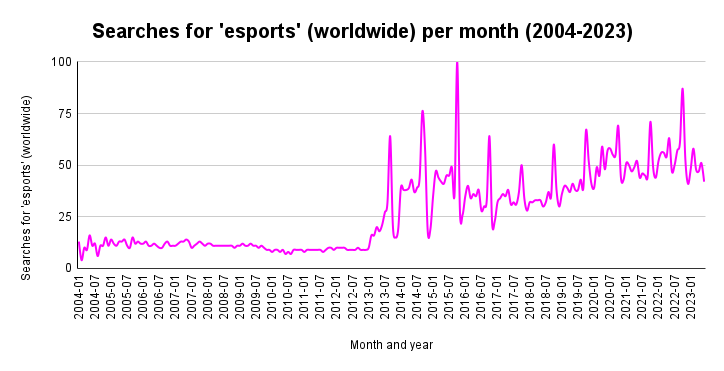Seven Standen
Over the last decade, esports has exploded into a worldwide phenomenon with a huge audience, market, and equivalent jackpot. Both amateur and professional players now battle to win prizes in online video games. It’s time to examine the ever-expanding landscape of competitive gaming.
Competitive gaming tournaments have been around since 1972 when students at Stanford University competed in games of Spacewar to win the grand prize: a year-long subscription to Rolling Stone magazine. A worthy prize, but one that pales in comparison to what esports players are awarded today. For those competing in the biggest competition in the world — The International — there is a total of 25.5 million dollars at stake. But how did video games transform from a private bedroom hobby to a sport with over 540 million viewers worldwide?
The birth of esports
Modern esports actually stem from face-to-face arcade game competitions. In 1974, two years after the competition at Stanford, Sega hosted a televised nationwide tournament in Japan. When arcade games introduced persistent high score lists, popularised by Space Invaders in 1978, the competition was heightened by players chasing after high scores and trying to get their names on the screen. The period from the late 1970s to the early 1980s is commonly known as the golden age of arcade video games. Although players had no idea at the time, this era would set the precedent for esports tournaments over the next forty years.
“A lot of these competitive games can bring together huge groups of people, allowing them to do what they love with others.”
The first video games for consumers, designed for people to play at home, had existed since the early 1970s. However, online multiplayer gaming had not been introduced until the release of Neverwinter Nights in 1991. Since then, competing against other players has become a central part of modern gaming, with the majority of games offering an online multiplayer mode. All the biggest video games we know today give players the opportunity to destroy their family, friends, and total strangers.
Saint, who competes in Splatoon on behalf of their university, believes that playing games with others is one of the main appeals of esports. They said: “A lot of these competitive games can bring together huge groups of people, allowing them to do what they love with others.”
The Impact of the Internet
Although competitions have long been a part of video game culture, it was not until the advent of online streaming platforms like YouTube and Twitch that competitive gaming was transformed from an amateur hobby into a professional sport. Forbes referred to 2012 as “the year of esports” and it certainly seemed to be the tipping point for video game competitions — rather than taking place among circles of friends or fanbases, esports began to transform into a global phenomenon with a huge audience.

Online, the use of the term “esports” in search engines shot up and, in just a few years, it went from a new fad to a household phrase. Although only 800,000 knew what the word meant in 2015, as of 2023, an incredible two billion people are now aware of esports.
The widespread appeal of esports
While the popularity of esports began in Asia, it is no surprise they have quickly become a global phenomenon. Plenty of gamers have grown up being told their skills are useless in the real world, due to the stigma attached to video games, but now have the chance to excel in their field — just like any other athlete.
Like chess, puzzles, or Scrabble, gaming tournaments allow people who are not necessarily athletic to compete on the same level as sporting champions. Succeeding in esports is incredibly liberating for people who spend a lot of time inside, make more friends online than in the real world, and have niche knowledge of gaming.
“Being able to watch competitors online, using platforms like Twitch, means that anyone can be a part of the esports community.”
Saint thinks the familial aspect of esports is one of the most valuable parts. They said: “I enjoy participating in esports because of the sense of community it welcomes, as well as a way for me to make friends via mutual interests. In my specific corner, no one can really judge each other because we are all essentially playing a kids’ game, competitively.”
The growth of the internet and the increased role it plays in our daily lives has also contributed to esports becoming part of the mainstream. Being able to watch competitors online, using platforms like Twitch, means that anyone can be a part of the esports community. Esports grew even more prevalent during the Covid-19 pandemic, with the number of viewers increasing by 96 million since 2020. Saint said playing games online was “one of the few ways people could connect with each other” during lockdown.
From computer nerds to professional athletes
Today, esports is valued globally at over 1.38 billion U.S. dollars and is only expected to continue growing for the foreseeable future — by 2029, experts predict it will be worth over 5.48 billion. In comparison, the global football market is predicted to be worth 4 billion, which means esports may overtake physical sports in terms of value. Asia and North America are still the biggest markets for esports, with China alone making up nearly 20% of the market, but they continue to be popular universally.
“The realisation there is an untapped market that has been uncovered is a huge reason esports have gotten bigger,” Saint explained. “For really big games, like League of Legends, you have teams sponsored by huge companies.”
“Will we really see esports overtake ‘real’ sports in terms of value and popularity, as experts are predicting?”
Although not all players are interested in making money from esports, some do set out to make their hobby into a professional career, Saint said: “There is definitely an aspect within those circles to try and form teams to hopefully hit that jackpot.”
Despite online video games being first developed less than 50 years ago, they have already transformed the face of sports and redefined what it means to be an athlete. As the term survives into the internet age, there is no telling what this could mean for the growth of esports. Will we really see esports overtake “real” sports in terms of value and popularity? Or, could global tournaments like The International one day take the place of the modern Olympics?
In a world where nerds reign supreme, it does not seem impossible.
READ NEXT:
-
THE RIVALRY THAT DEFINED AN ERA
-
THE BRATZ ARE BACK: A NEW VIDEO GAME AND SOCIAL MEDIA NOSTALGIA
-
THE DANGERS OF AI IN PORNOGRAPHY
Featured image courtesy of ELLA DON via Unsplash. Image license found here. No changes have been made to this image.

